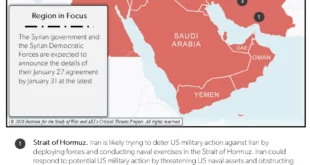 TEHRAN (Fars News Agency)- Crude oil rose after Iran, the Middle East’s second-largest exporter, said it will pursue nuclear research.
TEHRAN (Fars News Agency)- Crude oil rose after Iran, the Middle East’s second-largest exporter, said it will pursue nuclear research.
The UN Security Council voted for sanctions on Iran on Dec. 23 for refusing to suspend uranium enrichment. President Mahmoud Ahmadinejad said the next day that the world will have to accept Iran as a nuclear country. Violence in Nigeria added to concern that global supply may be disrupted.
“While the situation in Iran continues prices may test $65 a barrel,” said Makoto Takeda, an energy analyst at futures broker Bansei Securities Co. in Tokyo. “We may need to see actual disruptions to supply for prices to go higher.”
Crude oil for February delivery rose as much as 48 cents, or 0.8 percent, to $62.89 a barrel in electronic trading on the New York Mercantile Exchange. The contract traded at $62.78 at 10:53 a.m. Singapore time.
Crude oil futures didn’t trade in New York yesterday because of the Christmas holiday. Oil closed at $62.41 last week, the lowest since Dec. 13.
Iran’s Ahmadinejad on Dec. 24 rejected the UN resolution imposing sanctions on his country as a “scrap of paper.” The measures included a ban on materials that could be used to produce nuclear fuel for power plants. The US and other nations allege Iran aims to acquire atomic weapons, a claim Iran denies.
“Oil is highly vulnerable to the political developments,” Stephen Jansma, head of energy for Asia at Rabobank International in Singapore, said.
“A lot of those Iran barrels go to Asia, so we expect a lot of support from the Asian countries to adverse political movements against Iran.”
Iran is the second-biggest producer in the Organization of Petroleum Exporting Countries, which pumps 40 percent of the world’s oil. It sits on one side of the Strait of Hormuz, the waterway through which the United Arab Emirates, Saudi Arabia and Kuwait ship most of their crude exports.
“There’s a surfacing of geopolitical risks in Iran and also Nigeria,” said Hiroyuki Kikukawa, associate director of research at Nihon Unicom Corp. in Tokyo.
The Movement for the Emancipation of the Niger Delta, or MEND, a Nigerian group that has claimed responsibility for previous attacks on facilities belonging to Royal Dutch Shell Plc and Eni SpA, said it planted a car bomb in Port Harcourt in the nation’s main oil producing region on Dec. 23.
Four Eni SpA workers kidnapped this month by armed militants in Nigeria will be killed if the Italian oil company tries to pay ransom for their freedom, Il Giornale reported on Dec. 24, citing MEND spokesman Jomo Gbomo.
The three Italians and one Lebanese will be freed in exchange for the release of four prisoners being held in Nigerian prisons, Gbomo said. No negotiations with his group are currently taking place, he said.
Crude oil fell last week on speculation that warmer-than- usual weather in the US would limit demand for heating oil.
Home-heating demand in the Northeast, which accounts for 80 percent of US heating-oil use, will be 26 percent below normal in the week through Dec. 29, according to Weather Derivatives, a Belton, Missouri, forecaster.
 Eurasia Press & News
Eurasia Press & News



